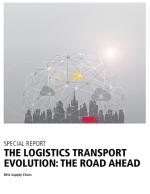Sharing Economy Logistics
From our roots as a courier service in the 1960s, we know that sharing is not new, what is new are the tools and attitudes with which people are sharing: smartphones and mobile technologies combined with shifting societal values are allowing companies with new business models to proliferate at unprecedented speed, scale, and valuation.
In the Sharing Economy, it has been proven that the rapid pace of technology and social change are powerful drivers of business model and value innovation.
Lessons learned from the hospitality, staffing, heavy industry, and mobility sectors provide valuable examples of how to embrace sharing across all parts of the logistics value chain.
In warehousing, the Sharing Economy stands to augment utilization and billing in existing shared customer warehouses.
In cities, logistics providers have an opportunity to support the growth of goods sharing and storage with new urban discreet warehousing and by providing community goods on demand.
In transportation, established logistics providers need to disrupt their own businesses with capacity sharing platforms before startups do this for them.
In addition the Sharing Economy presents new and creative ways to do business and realize internal efficiency gains with on-demand staffing models and logistics data sharing.
While a promising opportunity for new business creation, the Sharing Economy is not without its challenges.
Risk liability, insurance, transparency and workforce protection issues continue to hinder the progress of the Sharing Economy.
Most difficult of all is that the pace of technological innovation and social change has often outpaced regulatory frameworks, resulting in banned services and protest from those working in traditional industries.
Companies must work together with policy makers to drive the Sharing Economy forward in an equitable way to benefit all parties involved in its exchanges.
Going forward, further acceleration of technological innovation is likely to drive the Sharing Economy into another dimension of efficient allocation of goods and services.
The development of autonomous vehicles, specifically autonomous trucks, will drive down transportation costs, increase safety, and shorten transit times, thus rendering obsolete ride sharing and the road freight transportation industry as we know it today.
The further development of blockchain, the highly secure distributed ledger technology underpinning next-generation digital currencies, could disintermediate existing sharing platforms; individuals will be able to securely broker, share, and transact their own assets without an intermediary.
Finally, the rapid evolution of artificial intelligence and cognitive computing will revolutionize the digital orchestration of physical goods, material flows, and customer interaction with logistics providers and services.
It is time to rethink logistics with access over ownership, and explore new opportunities in the Sharing Economy that will create and capture new value for future supply chains.
What’s Related



Favorites





